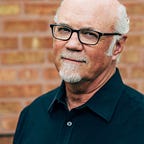The Best Books to Read to be a Better Writer
And not a single one is a how-to or craft book.
There is a famous quote attributed to television icon and comedian, Johnny Carson about learning one’s craft. He is believed to have said, “Genius is knowing what to steal.” Of course, Carson didn’t mean you should actually “steal” someone’s material or routine, plagiarize or rip off another artist. What he meant was to pay very close attention to how the greats conduct themselves in their art, how they do their work. Study them relentlessly and then do what they do.
For a writer that means you must read and read a lot. Read the classics, read across genres, read fiction and poetry and memoir and essays and short stories. Read the absolute best of the best. Study the sentences, the structure, the themes, the approach. All of it.
And Now the Question …
If you could read only ONE book to help you be the best writer you could be, what book would it be? Not a craft book or a how-to, but a straight-up narrative—fiction, nonfiction, memoir, poetry, short story collection, book of essays. Just one. It could be a book that inspired you or helped teach you the elements of storytelling, use of dialogue, how to use plot or how to avoid it.
I put that question to a number of writers. Here’s some of what they said.
And the Winners Are …
Lisa J. Lickel, author of Meander Scar and Centrifugal Force: “Dandelion Wine. Ray Bradbury was the king of story. Part memoir, all fiction, an essay on how to find your purpose, a commentary on how to be a noticer, and a challenge to better society. Timeless.”
Karla Manternach, author of Meena Meets Her Match: “I’m kinda in love with Anne Ursu’s Breadcrumbs.”
Dan Stout, author of Titanshade: “The Things They Carried. It’s where I learned about truth vs. details, and the difficulty of conveying something like boredom without boring the reader.”
Nancy Chadwick, author of Under the Birch Tree: “A Writer’s Diary by Virginia Woolf. This is not just a quick read of diary entries but an intimate look into a private world of a major essayist and literary critic of the twentieth century. This book was a great study in example of strong voice in memoir and what better way for hers to shine than through her diary entries.”
Andrew Reynolds, reviewer and short story writer: “Patrick O’Brian’s Aubrey Maturin series. Twenty historical fiction novels set in the Napoleonic War era, each one a compelling story in itself, and through it all, O’Brian keeps his characters interesting and the reader involved.”
Robin Martin, editor and owner of Two Songbirds Press; “This is not very highbrow, but I might have to say: The World According to Garp. It’s the first book that made me want to be a writer way back when. Each time I read it I am struck by the character development, the weaving of hefty story threads, the humor and the tragedy. And there are no gimmicks in it. Just good sentences.”
Ibrahim Oga, author of the Channillo online series: Vista of a Sisyphean Mind: “Going Down River Road by Meja Mwangi. I learnt to simply tell a story. While plot twists, climax, and conflicts are important, telling a story is all that matters.”
Bill Figel, writer and media consultant: “James T. Farrell’s Studs Lonigan trilogy. Taught me how to write for the ear, the way people really talk, much like Mark Twain.”
Sue Rovens, author of Track 9: “I would say Humans of New York Stories by Brandon Stanton. These are real stories from real people. Completely authentic. How people view their own life and talk about it in their own words cannot be duplicated. But, what a tremendous guideline into people’s psyche, how they communicate, how they express it, and what they really feel.”
And I Choose …
Since I’m writing this, I get to cheat a bit and name two works.
Ernest Hemingway’s short story, “Hills Like White Elephants.” I read it for the first time in a freshman English Literature class and was dumbfounded at the simplicity and power of this story. It made me want to write my own stories with the same direct style. And, a book, even if choosing one is hard to do: Gretel Ehrlich’s The Solace of Open Spaces. It is a remarkable memoir with incredible observational powers. I love how she writes “into” her thoughts in these essays rather than having a set or pre-determined end. This book, above others, forced me to consider my own observations and was a big influence on me as a memoirist.
Although there is a place for how-to and craft books for writers, the actual writing from the best writers is the only true teacher. Read, read, read, and read the works of the best, and then go write.
There are so many other books that fit the bill of the best books to read to be a better writer. If you have others, please share some in the comments.
